#women who run with wolves
Text
Sealskin, Soulskin
Story (written by Clarissa Pinkola Estés)
During a time that once was, is now gone forever, and will come back again soon, there is day after day of white sky, white snow... and all the tiny specks in the distance are people or dogs or bear. Here, nothing thrives for the asking. The winds blow hard so the people have come to wear their parkas and mamleks, boots, sideways on purpose now. Here, words freeze in the open air, and whole sentences must be broken from the speaker’s lips and thawed at the fire so people can see what has been said. Here, the people live in the white and abundant hair of old Annuluk, the old grandmother, the old sorceress who is Earth herself.
And it was in this land that there lived a man... a man so lonely that over the years, tears had carved great chasms into his cheeks. He tried to smile and be happy. He hunted. He trapped and he slept well. But he wished for human company. Sometimes out in the shallows in his kayak when a seal came near he remembered the old stories about how seals were once human, and the only reminder of that time was their eyes, which were capable of portraying those looks, those wise and wild and loving looks. And sometimes then he felt such a pang of loneliness that tears coursed down the well-used cracks in his face.
One night he hunted past dark but found nothing. As the moon rose in the sky and the ice floes glistened, he came to a great spotted rock in the sea, and it appeared to his keen eye that upon that old rock there was movement of the most graceful kind.
He paddled slow and deep to be closer, and there atop the mighty rock danced a small group of women, naked as the first day they lay upon their mothers’ bellies. Well, he was a lonely man, with no human friends but in memory—and he stayed and watched. The women were like beings made of moon milk, and their skin shimmered with little silver dots like those on the salmon in springtime, and the women’s feet and hands were long and graceful.
So beautiful were they that the man sat stunned in his boat, the water lapping, taking him closer and closer to the rock. He could hear the magnificent women laughing... at least they seemed to laugh, or was it the water laughing at the edge of the rock? The man was confused, for he was so dazzled. But somehow the loneliness that had weighed on his chest like wet hide was lifted away, and almost without thinking, as though he was meant, he jumped up onto the rock and stole one of the sealskins laying there. He hid behind an outcropping and he pushed the sealskin into his qutnguq, parka.
Soon, one of the women called in a voice that was the most beautiful he’d ever heard... like the whales calling at dawn... or no, maybe it was more like the newborn wolves tumbling down in the spring... or but, well no, it was something better than that, but it did not matter because... what were the women doing now?
Why, they were putting on their sealskins, and one by one the seal women were slipping into the sea, yelping and crying happily. Except for one. The tallest of them searched high and searched low for her sealskin, but it was nowhere to be found. The man felt emboldened—by what, he did not know. He stepped from the rock, appealing to her, “Woman... be... my... wife. I am... a lonely... man.”
“Oh, I cannot be wife,” she said, “for I am of the other, the ones who live temeqvanek, beneath.”
“Be... my... wife,” insisted the man. “In seven summers, I will return your sealskin to you, and you may stay or you may go as you wish.”
The young seal woman looked long into his face with eyes that but for her true origins seemed human. Reluctantly she said, “I will go with you. After seven summers, it shall be decided.”
So in time they had a child, whom they named Ooruk. And the child was lithe and fat. In winter the mother told Ooruk tales of the creatures that lived beneath the sea while the father whittled a bear or a wolf in whitestone with his long knife. When his mother carried the child Ooruk to bed, she pointed out through the smoke hole to the clouds and all their shapes. Except instead of recounting the shapes of raven and bear and wolf, she recounted the stories of walrus, whale, seal, and salmon.. for those were the creatures she knew.
But as time went on, her flesh began to dry out. First it flaked, then it cracked. The skin of her eyelids began to peel. The hairs of her head began to drop to the ground. She became naluaq, palest white. Her plumpness began to wither. She tried to conceal her limp. Each day her eyes, without her willing it so, became more dull. She began to put out her hand in order to find her way, for her sight was darkening.
And so it went until one night when the child Ooruk was awakened by shouting and sat upright in his sleeping skins. He heard a roar like a bear that was his father berating his mother. He heard a crying like silver rung on stone that was his mother.
“You hid my sealskin seven long years ago, and now the eighth winter comes. I want what I am made of returned to me,” cried the seal woman.
“And you, woman, would leave me if I gave it to you,” boomed the husband.
“I do not know what I would do. I only know I must have what I belong to.”
“And you would leave me wifeless, and the boy motherless. You are bad.”
And with that her husband tore the hide flap of the door aside and disappeared into the night.
The boy loved his mother much. He feared losing her and so cried himself to sleep... only to be awakened by the wind. A strange wind... it seemed to call to him, “Oooruk, Oooruuuuk.”
And out of bed he climbed, so hastily that he put his parka on upside down and pulled his mukluks only halfway up. Hearing his name called over and over, he dashed out into the starry, starry night.
“Ooooooomuuuk.”
The child ran out to the cliff overlooking the water, and there, far out in the windy sea, was a huge shaggy silver seal... its head was enormous, its whiskers drooped to its chest, its eyes were deep yellow.
“Ooooooomuuuk.”
The boy scrambled down the cliff and stumbled at the bottom over a stone—no, a bundle—that had rolled out of a cleft in the rock. The boy's hair lashed at his face like a thousand reins of ice.
“Oooooooruuuuk.”
The boy scratched open the bundle and shook it out—it was his mother's sealskin. Oh, and he could smell her all through it. And as he hugged the sealskin to his face and inhaled her scent, her soul slammed through him like a sudden summer wind.
“Ohhh,” he cried with pain and joy, and lifted the skin again to his face and again her soul passed through his. “Ohhh,” he cried again, for he was being filled with the unending love of his mother.
And the old silver seal way out... sank slowly beneath the water.
The boy climbed the cliff and ran toward home with the sealskin flying behind him, and into the house he fell. His mother swept him and the skin up and closed her eyes in gratitude for the safety of both.
She pulled on her sealskin. “Oh, mother, no!” cried the child.
She scooped up the child, tucked him under her arm, and half ran and half stumbled toward the roaring sea.
“Oh, mother! No! Don’t leave me!” Ooruk cried.
And at once you could tell she wanted to stay with her child, she wanted to, but something called her, something older than she, older than he, older than time.
“Oh, mother, no, no, no,” cried the child. She turned to him with a look of dreadful love in her eyes. She took the boy’s face in her hands, and breathed her sweet breath into his lungs, once, twice, three times. Then, with him under her arm like a precious bundle, she dove into the sea, down, and down, and down, and still deeper down, and the seal woman and her child breathed easily underwater.
And they swam deep and strong till they entered the underwater cove of seals where all manner of creatures were dining and singing, dancing and speaking, and the great silver seal that had called to Ooruk from the night sea embraced the child and called him grandson.
“How fare you up there, daughter?” asked the great silver seal.
The seal woman looked away and said, “I hurt a human... a man who gave his all to have me. But I cannot return to him, for I shall be a prisoner if I do.”
“And the boy?” asked the old seal. “My grandchild?” He said it so proudly his voice shook.
“He must go back, father. He cannot stay. His time is not yet to be here with us.” And she wept. And together they wept.
And so some days and nights passed, seven to be exact, during which time the luster came back to the seal woman’s hair and eyes. She turned a beautiful dark color, her sight was restored, her body regained its plumpness, and she swam uncrippled. Yet it came time to return the boy to land. On that night, the old grandfather seal and the boy’s beautiful mother swam with the child between them. Back they went, back up and up and up to the topside world. There they gently placed Ooruk on the stony shore in the moonlight.
His mother assured him, “I am always with you. Only touch what I have touched, my firesticks, my ulu, knife, my stone carvings of otters and seal, and I will breathe into your lungs a wind for the singing of your songs.”
The old silver seal and his daughter kissed the child many times; At last they tore themselves away and swam out to sea, and with one last look at the boy, they disappeared beneath the waters. And Ooruk, because it was not his time, stayed.
As time went on, he grew to be a mighty drummer and singer and a maker of stories, and it was said this all came to be because as a child he had survived being carried out to sea by the great seal spirits. Now, in the gray mists of morning, sometimes he can still be seen, with his kayak tethered, kneeling upon a certain rock in the sea, seeming to speak to a certain female seal who often comes near the shore. Though many have tried to hunt her, time after time they have failed. She is known as Tanqigcaq, the bright one, the holy one, and it is said that though she be a seal, her eyes are capable of portraying those human looks, those wise and wild and loving looks.
Overview
Soul initiation, illustrated by the tale of “Sealskin, Soulskin”, mirrors personal growth as we retrieve our stolen 'soulskin' or essence, akin to a seal pup’s maturation. Missteps along the journey are seen as opportunities for self-insight and growth.
The loss of one’s 'pelt' symbolizes disconnecting from one's inner self due to societal pressures or personal setbacks. To prevent this, conscious awareness of personal needs and setting healthy boundaries are necessary.
The narrative further depicts the dynamic between ego (the man) and soul (the seal woman), highlighting the ego's initial dominance and eventual submission to the soul. The symbolic child of their union signifies the challenging yet rewarding integration of these aspects, embodying our inner voice pushing towards self-realization.
We often struggle with societal constraints inhibiting our wildish instincts. This emotional stifling is like trying to fit into an ill-fitted suit, leading to a dried-out state devoid of 'moisture' necessary for creativity and life. Overcoming this demands a return to our intuitive nature, symbolized by the unconscious 'caller' guiding us back to our true selves.
Returning to oneself suggests an innate journey back to a familiar inner peace, a space of completeness, accessible to everyone. This personal 'home' is an environment of self-reflection and harmony, triggered by music, art, solitude, or nature. In this tranquil space, we can understand ourselves better, remember past experiences, and plan the future.
Neglecting this call can lead to a numbed sense of self and emotional discontentment. However, acknowledging this call, no matter how delayed, can catalyze transformative change, akin to rain on a parched landscape.
The frequency of these inward journeys varies for each person, influenced by their sensitivity, external engagement, and emotional resilience. They need careful balancing with daily life, as denying this internal journey can lead to emotional rifts and emptiness. Understanding and honoring our cycles of return to this inner 'home' leads to a harmonious existence. The difficulty lies in the necessity to return from these depths to our ordinary existence.
Our connection to this deeper consciousness is maintained through symbolic tools which represent our ability to shape our lives, rise from failure, and maintain our connection to 'home'. The promise is that by utilizing these psychic strengths, we'll feel infused with a sacred wind for singing. This singing represents speaking our truths and living in alignment with our soul.
Reintegration into daily life after such deep introspection might feel alienating, but this feeling is natural and temporary. The energies gathered during our deep psychic journey fuel our mundane life, and solitude serves as a bridge between these two worlds.
Traditionally found in secluded natural spaces, solitude is a time for healing, reflection, and connection with our unconscious mind. In this solitude, we call on our soul, asking for guidance and advice. This summoning can be achieved through various activities that resonate with us, requiring no special location or props, allowing us to carry our 'folded-up' solitude wherever we go.
Despite countless attempts to suppress or kill the wild spirit within us, it remains undying. It survives even when we operate out of sync with it, feeling exhausted but never eradicated. We can correct course, realign with our inner rhythm, and find our way back to our natural cycle. By acknowledging and respecting our distinct rhythms for work, play, rest, and creation, we safeguard our lives from the distortions imposed by others' demands or societal norms.
We intuitively know that we cannot thrive in a life that's not our own. We are like amphibians, capable of living on land but periodically needing to return to the water—our primal, spiritual home. The soul's path, as Carl Jung posited, leads to water—the spiritual sustenance we all need. These periodic returns, these moments of communion with our wild, innate spirit, are integral to our psychic ecology. It is through these encounters that we bask in the love and wisdom of our untamed selves.
10 notes
·
View notes
Text
the human race depends greatly on,
simply, women alone.
Are we all mad?
since when has creation drawn such a chaos?
such a struggle… to survive?
/ a struggle.. to give life?
#choas#txt#questions#ask tumblr#archives of our own#artistry#artists on tumblr#women who run with wolves#multiverse of madness#survival
3 notes
·
View notes
Text






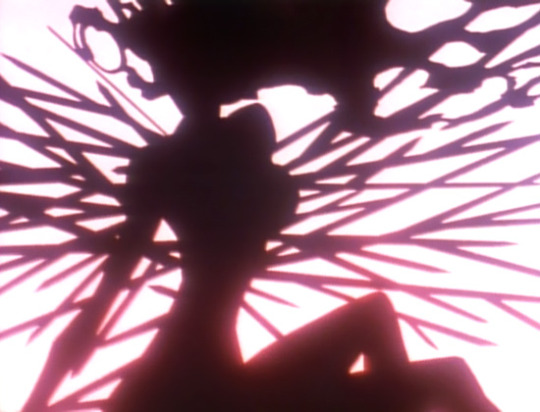
Shameful secrets cause a person to become haunted. She cannot sleep, for a shaming secret is like a cruel barbed wire that catches her across the gut as she tries to run free.
(Clarissa Pinkola Estés, Women Who Run With the Wolves)
the fact that no one* knew about akio's abuse of anthy is far from the only thing wrong with it, but the inherent shameful secrecy of it was an integral part of her abuse, something that significantly served to isolate anthy from her peers.
it was definitely akio's plan for utena to see anthy and akio at the end of ep. 36. (anthy's hands disappear into her hair = she had no hand in this. + the way the scene lights up like how lights come on at the beginning of a new scene in a play (anthy's previously black silhouette gaining color and features) = it was staged. not to mention her bleak expression) akio thought that utena would just be disgusted by her, and/or feel betrayed, and that would be that. however, he sealed his fate (anthy being able to ditch him) with this action, because utena offered anthy compassion and understanding instead of condemning her.
utena acknowledging anthy's pain as a result of being abused by akio touched anthy more than any of utena's other actions up to that point. while utena says a lot of stuff in that scene about utena's ego and being a prince, anthy only has visible reactions to two of utena's lines until utena is completely done speaking.
"And the night I learned about you and Akio...!"
the camera focuses completely on anthy, nothing else shown, as anthy slightly tilts her head up. there is no dialogue while anthy makes this small movement; anthy is listening intently for what utena will say next, and the show wants us to notice that.
"I thought that you had betrayed me. Even though you were suffering so much...!"
when utena talks about suffering- acknowledging that akio's treatment of anthy caused anthy pain- anthy uncurls her body significantly. a visual indicator of feeling less shame, immediately in that moment.
anthy does not move in reaction to anything else utena says until utena is fully done speaking, when anthy and utena are now shown kinda-holding eachother. utena may or may not know the full impact of her words, but it is clear to the viewers what moved anthy to say:
"It doesn't matter now. Just leave this school. Forget about everything that happened here!"
in anthy's opinion, this has to be the kindest, most honest thing she can say in this moment. utena leaving would ruin akio's plan and anthy would be the obvious reason why (likely leading to punishment), not to mention how anthy would obviously miss utena. the fact anthy said it anyway shows how impactful utena's statement was
it's good to talk about utena's obsessive girlprincing and how it was damaging. it's good that utena acknowledges it herself. but i think the fandom commonly overestimates how much that mattered to anthy, especially in relation to this scene. i feel that people sometimes abbreviate it as 'utena apologized to anthy for her egotistical behavior, and that brought them closer together!' like yes, she did and that was positive and indicative of utena maturing. but i do not think that was the most important aspect here
#rgu#anthy himemiya#women who run with the wolves#*(nanami and touga knew eventually but that's neither here nor there#if anything nanami knowing and treating anthy like even more of a weirdo for it would reinforce anthy's shame#not that i blame nanami. she is 13 and in hell)
235 notes
·
View notes
Text
The Greek goddess Baubo had eyes for tits and a vulva for a mouth, and her baudy jokes were so raunchy, they brought Demeter out of her depression over losing her daughter (Persephone), ending the endless winter.
Don't worry about being the main character of whatever 'story' you find yourself in. Be a talking cunt and you might just save the world.
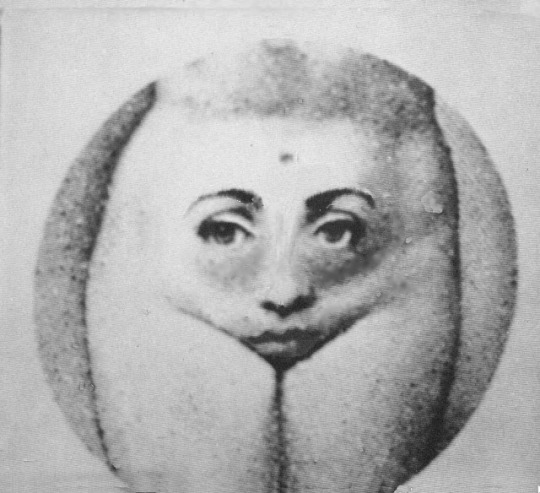
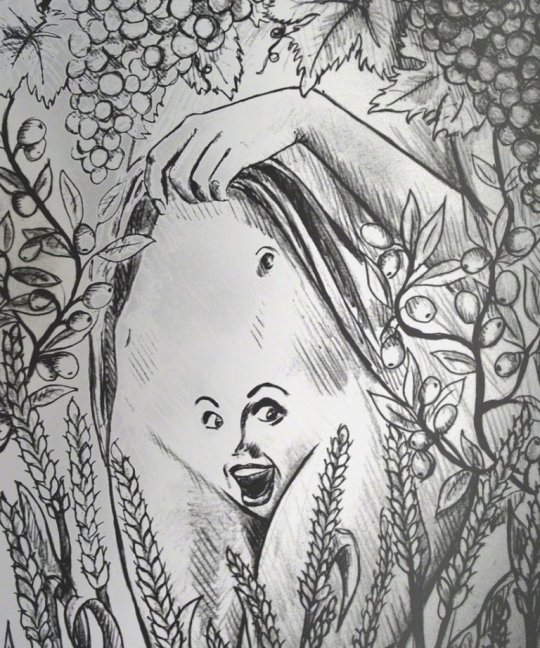
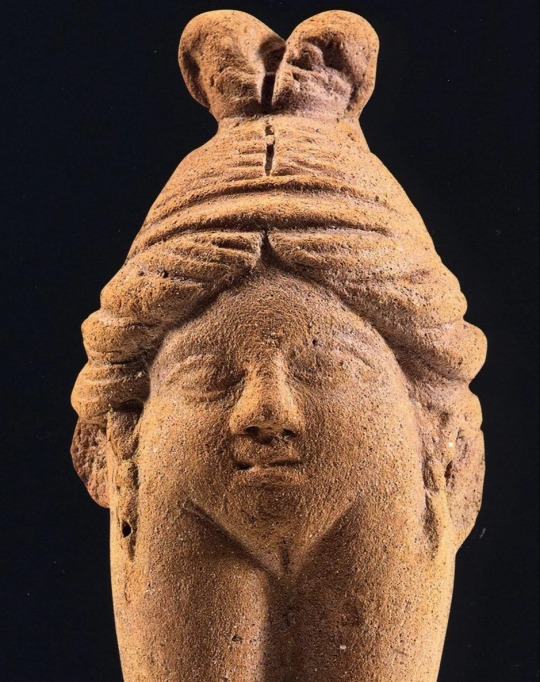
666 notes
·
View notes
Text
Unedited raw footage of Lana's birdcage monologue, for Coachella week two. 🌴
Wild woman archetype: there’s usually tremendous suffering involved in the human life, in the human woman who stands in front of this particular archetype. They’re trained to remain contained. To never really spread their wings, and especially never to find those who are like themselves. That was considered very very dangerous. The domestication of the wild continued so young females are taught to not like spit and moistness and sweat and other effluvia, and out of the many possibilities of what it means to be female, only two aspects were given weight. It is sweet mother who always takes care and shows concern for everything and everybody and the know-nothing maiden who’s always sweet, cute and innocent. Which leaves out the whole instinctual and animal nature of a woman. Yet by the time most women who are raised as captive creatures, by the time they were teenagers, they were exposed to art cinema. They were exposed to Latin poets. They were exposed to things and ideas and often lovers even who ask them to please be a full person. So the veils that were laid down to keep the girls separate from their animal nature - well sometimes they were torn and certainly wavered on young women of that time was slipping away because the sensuality of those women, which is not only sexual but also creative, was calling to them more and more strongly all the time. And the “thou shalt nots” were as much a part of the cage that they had experienced as their familial injunctions were. So many many women during that time, not just in America, but in Europe as well, threw over the old order, said “no, I won’t be caged anymore, I want to be free!” And they went out for the first time in their lives and into the world.”
94 notes
·
View notes
Text
“We have been taught that death is followed by more death. It is simply not so, death is always in the process of incubating new life, even when one’s existence has been cut down to the bones.”
Women Who Run With the Wolves, by Clarissa Pinkola Estés
609 notes
·
View notes
Text
She can still hear whispers of the wild God in her blood.
Clarissa Pinkola Estés
Women Who Run with Wolves
#quote#quotes#clarissa pinkola estes#clarissa pinkola estés#women who run with the wolves#book quote
183 notes
·
View notes
Text
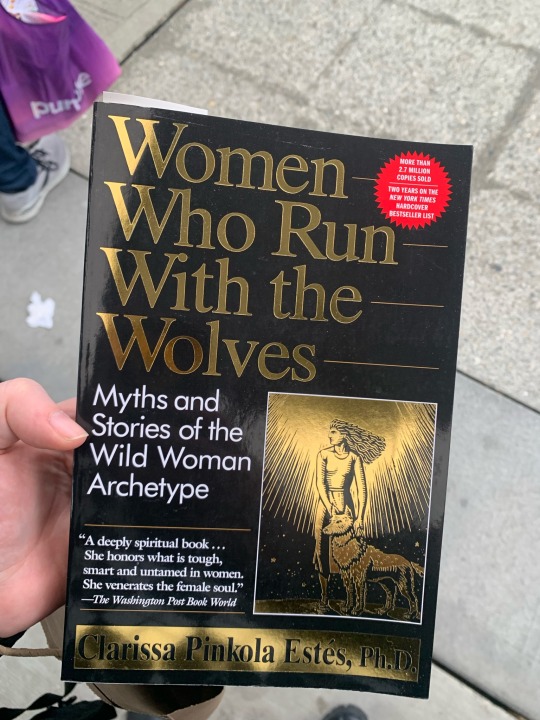
Hello yes we have acquired the WolfWren bible 💖
56 notes
·
View notes
Text
The deepest work is usually the darkest. A brave woman, a wisening woman, will develop the poorest psychic land, for if she builds only on the best land of her psyche, she will have for a view the least of what she is. So do not be afraid to investigate the worst.
The naive woman tacitly agrees to remain "not knowing." Women who are gullible or those with injured instincts still, like flowers, turn in the direction of whatever sun is offered.
― Clarissa Pinkola Estés, Women Who Run With the Wolves
91 notes
·
View notes
Text
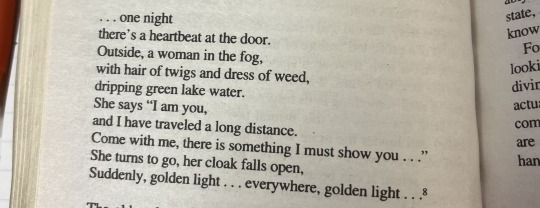
Woman who lives under the lake
#woman who lives under the lake#homing signal#will always find its way back to you#wild women#Clarissa Pinkola Estés#women who run with the wolves#myths and stories of the wild woman archetype
61 notes
·
View notes
Text
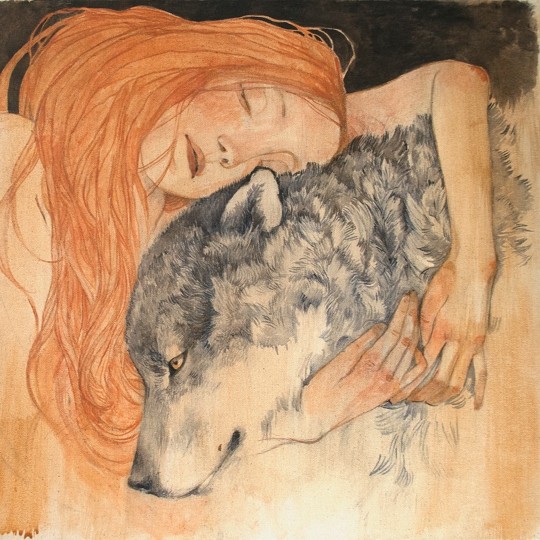
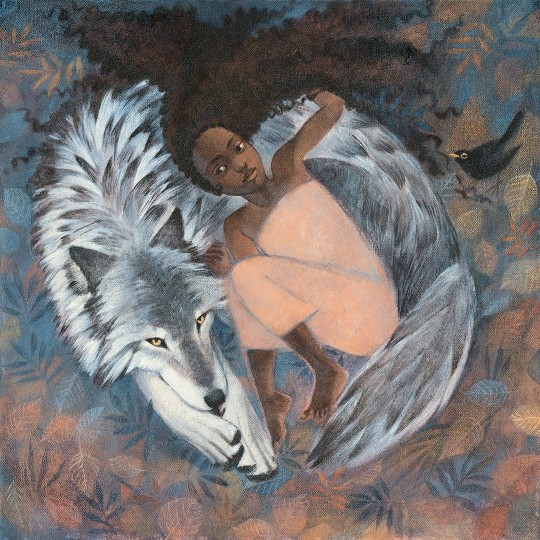

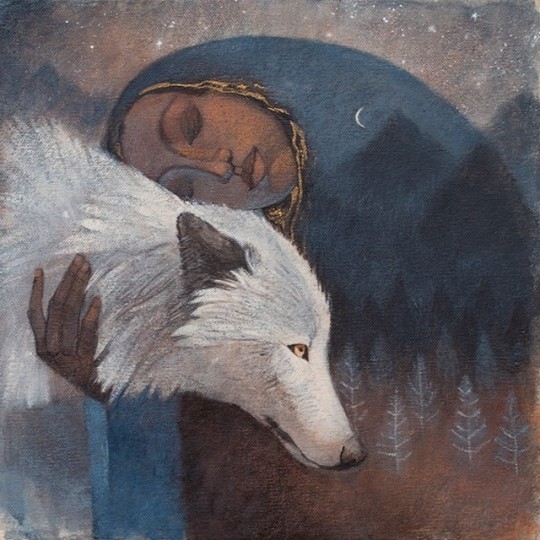
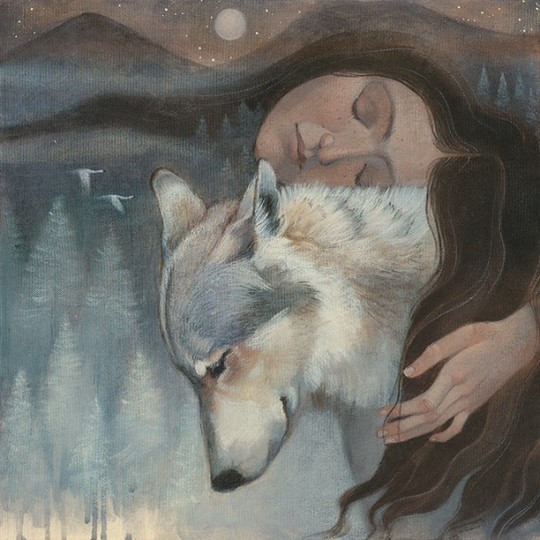
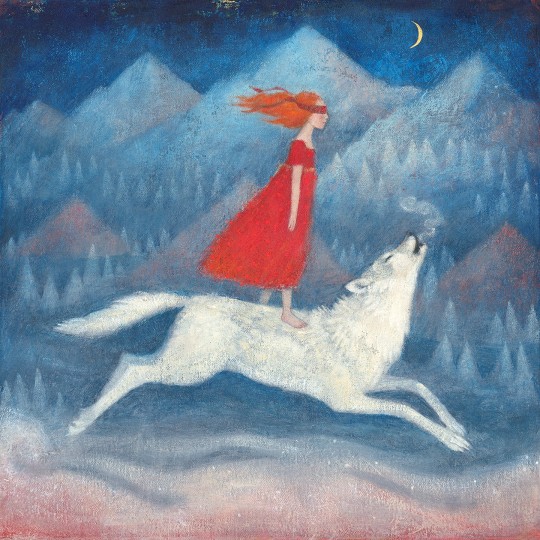


@lucy_campbell_art
"Wolves, and women.... lately I've seen a lot of posts sharing quotes from Clarissa Pinkola Estés, author of "Women Who Run with the Wolves", with images of mine. I am always super happy when people pair my wolf images with her words, because that book has undoubtedly been one of THE most powerful influences on my work and life as an artist (and a woman). I come back to it time and time again, when I feel stagnant in my creative life, when floundering in my emotional life, when I find myself in a time of energetic shift and transformation, when experiencing death and rebirth cycles. . . Right now I am reminding myself of her wisdom about living with intention... . . "The way to maintain one's connection to the wild is to ask yourself what it is you want. This is the sorting of the seed from the dirt. One of the most important discriminations we can make in this matter is the difference between things that beckon to us and things that call from our soul." . . How do you discern between what is "beckoning" and what is calling from your soul? I find that really tough sometimes!
(Links in my bio to where you can find these wolves in print 🐺)
319 notes
·
View notes
Text

#divine feminine#queen energy#princess treatment#that girl#it girl#high value woman#girly blog#leveled up mindset#self love journey#level up tips#dream girl journey#women who run with the wolves
68 notes
·
View notes
Quote
I hope you will go out and let stories happen to you, and that you will work them, water them with your blood and tears and your laughter till they bloom, till you yourself burst into bloom.
Clarissa Pinkola Estés; Women Who Run With the Wolves
#clarissa pinkola estes#women who run with the wolves#text#quote#quotes#love#love quotes#life#life quotes#relationship#relationship quotes#beautiful#aesthetic#art
1K notes
·
View notes
Quote
If you have attempted to fit whatever mold and failed to do so, you are probably lucky. You may be an exile of some sort, but you have sheltered your soul.
Clarissa Pinkola Estés, Women Who Run With the Wolves: Myths and Stories of the Wild Woman Archetype
890 notes
·
View notes
Text
What does one feed intuition so that it is consistently nourished and responsive to our requests to scan our environs? One feeds it life—one feeds it life by listening to it. What good is a voice without an ear to receive it?
— Clarissa Pinkola Estés, Women Who Run With the Wolves. (Ballantine Books, 1992) (via Alive on All Channels)
25 notes
·
View notes

